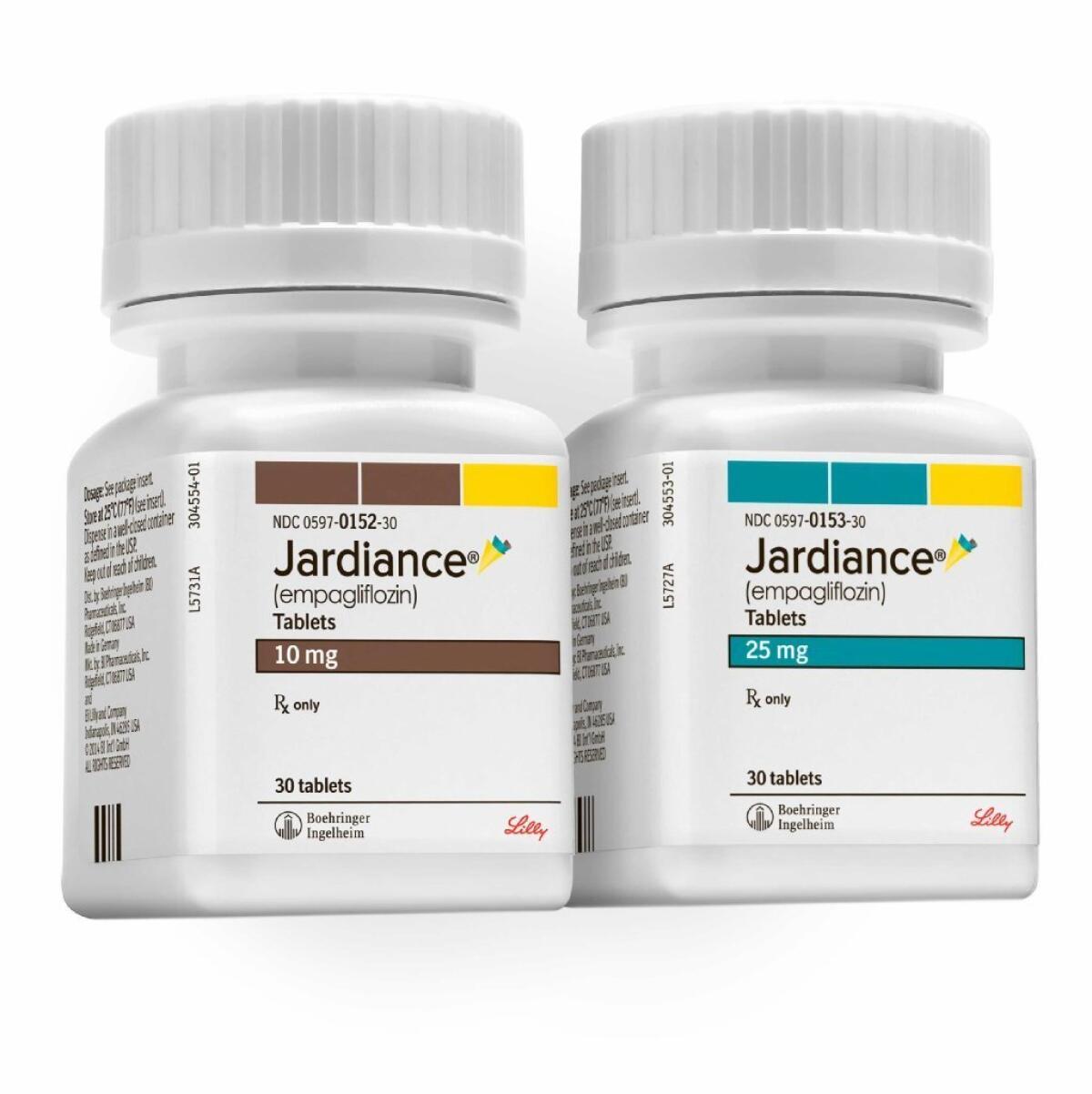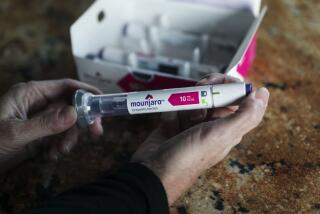‘Amazing’ diabetes drug drives down fatal heart attacks and strokes, study finds

Jardiance, the third in a new class of diabetes drugs that help lower blood glucose, appears to help prevent heart attacks, strokes and premature death in diabetes patients. It would be the first diabetes medication to do so.
Just as doctors were losing hope that they would find a drug capable of reducing heart risks for patients with diabetes, a new study identified one that may drive down the chances that such patients will die of a heart attack, stroke or heart failure.
Compared with clinical trial subjects who took a placebo, those who added Jardiance to their regimen of diabetes medications were 38% less likely to die as a result of a heart attack, stroke or other cardiovascular problem during the approximately three years that subjects were tracked.
In addition, those taking Jardiance were 35% less likely to be hospitalized for heart failure than those who took the placebo, and 32% less likely to die of any cause.
The clinical trial results, which were published this week in the New England Journal of Medicine, surprised doctors who had become accustomed to disappointing findings about diabetes treatments.
“It’s an amazing result; very unexpected and wonderful news,” said Dr. Christopher P. Cannon, a cardiologist at Brigham and Women’s Hospital in Boston who was not involved in the study.
Four major trials of other drugs have shown that although they improved the metabolic function of diabetes patients, they failed to reduce the number of heart attacks, strokes or cardiovascular deaths. In some cases, the medications were associated with a higher risk of fatal heart attacks and strokes.
“This is the first time ever that a diabetes drug has shown evidence of cardiovascular benefit,” said Cleveland Clinic cardiologist Steven Nissen, who helped persuade the Food and Drug Administration to consider heart risks when it evaluates the safety of diabetes medications. “Obviously, this is an important finding.”
Jardiance, also known generically as empagliflozin, is the third in a new class of drugs that reduce blood sugar in diabetes patients by helping eliminate it in their urine. The FDA cleared the way for the drug to be marketed in the U.S. last year. Trials underway will explore whether other drugs in the same class, including Farxiga and Invokana, offer the same benefits.
But the drug’s price tag, about $350 per month, has raised concern. Britain’s National Health Service has said it will not pay for the medication because it’s not cost-effective.
Jardiance’s sponsors — Boehringer Ingelheim Pharmaceuticals Inc. and Eli Lilly and Co. — conducted the new clinical trial on orders from the FDA. The findings suggest that among diabetes patients with established cardiovascular disease, 39 people would need to be treated with Jardiance to prevent one premature death.
Experts say it’s hard to draw clear comparisons with other drugs because the participants in this trial were at unusually high risk of early cardiovascular death. But the “number-to-treat” figure puts the drug’s effectiveness close to that of cholesterol-lowering statins and possibly ahead of blood pressure medications known as ACE inhibitors, said Dr. Silvio E. Inzucchi, a Yale Medical School endocrinologist who worked on the trial.
Since statins and ACE inhibitors are already in wide use among diabetes patients, doctors had begun to fear there was little more they could do to prevent heart attacks and strokes, Inzucchi said.
“It’s almost like, how much more benefit can you get?” he said in an interview from Stockholm, where the results were presented to a meeting of the European Assn. for the Study of Diabetes. “Personally, I was shocked by the findings.”
The need for improvement is clear. About 23.6 million American adults have diabetes, a disease that is closely tied to the nation’s obesity epidemic. People with Type 2 diabetes are five to eight times more likely than the general population to develop cardiovascular disease, and to suffer a fatal heart attack or stroke. Four in 5 people with diabetes will die of coronary heart disease, the accumulation of plaque in the arteries.
Nissen, who wasn’t involved in the study, noted that some of its findings were less than stunning. Compared with subjects taking a placebo, those taking Jardiance were only slightly less likely to suffer a nonfatal heart attack and were slightly more likely to suffer a nonfatal stroke.
But when deaths from strokes, heart attacks and heart failure were combined, the group taking Jardiance was unmistakably better
off.
In the hierarchy of outcomes, “death trumps everything else,” Nissen said. “When you have an effect on death, you have to pay attention.”
In all, 194 of 2,333 subjects (8.3%) taking the placebo died of any cause during the course of the study, compared with 269 of the 4,687 subjects (5.7%) taking Jardiance. The rates of death due solely to cardiovascular causes were 5.9% for the placebo group and 3.7% for the Jardiance group.
Those taking Jardiance also lost more weight and more inches around their waist, and saw their blood pressure and “bad” cholesterol fall more steeply. Those taking the drug experienced more genital infections than those taking the placebo.
The range of Jardiance’s beneficial effects has prompted speculation about how it could succeed where so many other diabetes medications have failed.
Inzucchi suggested that empagliflozin’s diuretic effect may have an unforeseen benefit beyond lowering blood sugar, especially for diabetics whose hearts are nearing the point of failure. But he and the paper’s other authors acknowledge that they are unsure how the medication might work to forestall cardiovascular problems.
Follow me on Twitter @LATMelissaHealy and “like” Los Angeles Times Science & Health on Facebook.







